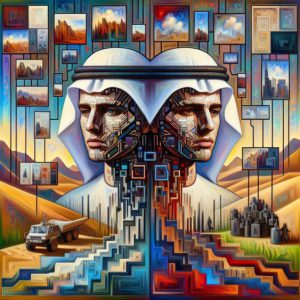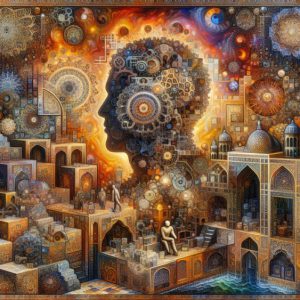
Virtual Immortality Unleashed: Secrets to Eternal Life
Nov 1, 2023
The concept of virtual immortality, where our consciousness or digital footprint is preserved after physical death, has indeed gained attention and sparked discussions in recent years. While the idea may be intriguing, some several critical considerations and challenges need to be addressed.
One of the primary concerns is the reliability and longevity of the digital infrastructure that supports virtual immortality. Technological systems can fail, become obsolete, or be vulnerable to cyber threats. If the infrastructure housing our digital replicas were to falter or disappear, the continuity of our virtual existence would be jeopardized.
Another significant challenge is ensuring the authenticity and fidelity of our digital duplicates. Creating a digital replica that truly captures the complexity and essence of a human being is an immense task. It would require sophisticated artificial intelligence and advancements in neuroscience to replicate not only our thoughts and memories but also our emotions, consciousness, and subjective experiences.
Ethical considerations also loom large in the pursuit of virtual immortality. Generating digital replicas of human beings raises profound questions about identity, autonomy, consent, and the definition of what it means to be alive. The creation and use of digital duplicates could raise significant ethical dilemmas, including issues of privacy, ownership, and the potential for misuse or exploitation.
Furthermore, virtual immortality could exacerbate existing social inequalities. Access to such technology and the ability to create and maintain digital replicas could become a privilege limited to a select few, creating disparities between those who can afford virtual immortality and those who cannot.
As we contemplate the concept of virtual immortality, it is crucial to reflect and consider it carefully. Ethical frameworks, legal regulations, and societal consensus must be established to address this emerging field’s complex challenges and potential risks. The impact on personal identity, social dynamics, and human relationships should be thoroughly explored to ensure that the pursuit of virtual immortality aligns with our values and serves the collective well-being.
Ultimately, while the idea of eternal life in the digital realm may be captivating, it remains a concept that raises profound questions and necessitates comprehensive exploration and dialogue among scientists, ethicists, policymakers, and society.
Exploring the Boundaries of Digital Immortality
Indeed, the field of digital immortality is advancing, and the exploration of preserving and replicating human consciousness has captured the imagination of many. The idea of uploading our minds to the cloud and existing as digital beings raises profound questions and considerations for the future of humanity.
On one hand, digital immortality could potentially offer benefits. It might allow individuals to continue their existence beyond the limitations of the physical body, enabling the preservation of knowledge, experiences, and wisdom. The ability to interact with digital replicas of deceased loved ones might provide solace and emotional support to those left behind. It could also open up new avenues for creativity, exploration, and collaboration, as digital entities could potentially communicate and share knowledge in unprecedented ways.
However, there are significant challenges and ethical dilemmas to address. The concept of digital immortality challenges our understanding of what it means to be human and raises questions about personal identity and the nature of consciousness. The potential loss of the physical body raises concerns about the loss of sensory experiences and embodied existence. Additionally, the risks of identity theft, unauthorized access, or manipulation of digital replicas need to be carefully considered.
Furthermore, the implications of digital immortality on society and humanity as a whole are complex. If death were no longer a natural part of life, it could have far-reaching consequences on population growth, resource allocation, and the dynamics of human relationships. It could fundamentally reshape societal structures, values, and cultural practices.
To navigate the path of digital immortality, a balanced approach is crucial. It requires careful consideration of the potential benefits, ethical implications, and societal impact. Engaging in interdisciplinary discussions involving scientists, philosophers, ethicists, policymakers, and the wider public is necessary to shape the future of digital immortality in a way that aligns with our values and upholds the well-being of individuals and society.
As technology continues to evolve, it is essential to approach the boundaries of digital immortality with thoughtful reflection, ethical frameworks, and an understanding of the potential consequences. Only through responsible exploration and conscientious decision-making can we navigate this emerging field and determine how it should be integrated into our lives and the future of humanity.
What is Virtual Immortality?
Virtual immortality refers to the concept of using technology to extend a person’s existence beyond their physical lifespan. It involves preserving and replicating their consciousness, memories, personality traits, and experiences in a digital format. By doing so, individuals could potentially continue to exist and interact in the digital realm even after their physical bodies have ceased to function.
The idea of virtual immortality encompasses various approaches and technologies. These may include creating digital avatars that mimic a person’s appearance and behaviour, storing their memories and knowledge in a cloud-based system for future access, or attempting to transfer their consciousness into a computer or digital system.
The realization of virtual immortality raises profound questions and challenges. It touches on fundamental aspects of human identity, the nature of consciousness, and the ethics surrounding digital replication. There are debates about whether a digital replica or consciousness upload can truly capture the essence of a person, as well as concerns about privacy, security, and potential misuse of such technology.
It is important to note that virtual immortality is still largely speculative and a subject of exploration and debate. While advancements in technology may make certain aspects of virtual immortality feasible, significant scientific, ethical, and philosophical challenges need to be addressed before they becomes a reality.
Overall, virtual immortality represents a fascinating concept that explores the intersection of technology and human existence. It invites contemplation about the boundaries of life, the nature of consciousness, and the potential implications of extending our existence in the digital realm.
How Does Virtual Immortality Work?
Virtual immortality, also known as digital immortality, is a concept that explores the preservation and replication of a person’s consciousness or essence in a digital form. While it remains theoretical mainly, there are several hypothetical approaches to achieving virtual immortality:
1. Mind Uploading: This approach involves mapping and transferring a person’s consciousness from their biological brain to a digital substrate. It would require a detailed understanding of the brain’s neural connections and processes and advanced technology to replicate and simulate these processes in a digital medium.
2. Digital Avatars: Creating digital avatars is another method for virtual immortality. These avatars would be lifelike representations of individuals, capable of interacting and communicating with others. They would mimic the person’s appearance, voice, and behaviour, providing a sense of continuity and presence even after their physical body is no longer alive.
3. Data Collection and Analysis: Virtual immortality can also be approached by collecting and analyzing vast amounts of data about a person’s life, experiences, and personality. This data could include social media posts, personal writings, recorded conversations, and other digital artefacts. Processing and analyzing this data using artificial intelligence and machine learning algorithms could create a digital representation of the person’s thoughts, memories, and behaviours.
4. Augmented Reality and Virtual Reality: Virtual immortality could be achieved through immersive technologies such as augmented reality (AR) or virtual reality (VR). By creating immersive digital environments and experiences that simulate the presence and interactions of deceased individuals, their memories and personalities could be preserved and accessed by others.
It is important to note that achieving virtual immortality is highly speculative and faces numerous scientific, technological, and ethical challenges. Questions about the nature of consciousness, personal identity, and the authenticity of digital replicas arise. Ethical considerations include consent, privacy, data security, and potential misuse of personal information.
While virtual immortality captures the imagination, it remains an area of ongoing research and debate. As technology advances, it will be essential to address these challenges and ethical concerns to determine the feasibility and implications of virtual immortality in the future.
Achieving Virtual Immortality
While achieving virtual immortality is intriguing, it is crucial to recognize the current limitations and challenges associated with replicating human consciousness and achieving digital immortality. The complexity of the human brain and the nature of consciousness pose significant scientific and technological hurdles that need to be overcome.
The human brain is a highly intricate and dynamic system, and our understanding of its workings is still incomplete. Mapping and replicating the vast network of neural connections and processes that give rise to consciousness is a monumental task. Additionally, the concept of consciousness itself remains a topic of scientific inquiry and philosophical debate, making it difficult to define and replicate.
Ethical considerations are also paramount when exploring virtual immortality. Questions about consent, privacy, and the responsible use of personal data arise. It is crucial to ensure that individuals have control over how their digital replicas are created, accessed, and used. Another significant challenge is safeguarding data security to prevent unauthorized access, manipulation, or misuse.
While advancements in artificial intelligence and brain-computer interfaces show promise, achieving virtual immortality in its truest sense remains speculative and faces significant obstacles. Continued research and interdisciplinary collaboration are necessary to deepen our understanding of the brain and consciousness, develop robust technological frameworks, and address ethical concerns.
Pursuing virtual immortality should not overshadow the value and significance of human mortality. Mortality is an inherent part of the human experience, shaping our relationships, priorities, and the appreciation of our limited time. Exploring virtual immortality should be done thoughtfully considering its implications and with a broader understanding of the human condition.
Pros of Virtual Immortality
Preserving knowledge and memories is one of the most significant advantages of digital immortality. By creating digital replicas of individuals, we can ensure that their knowledge and experiences are not lost after death. This could have significant implications for fields such as science and medicine, where the understanding of deceased experts could be used to advance research.
In addition to preserving a person’s legacy, digital immortality offers continued learning and growth potential. With digital replicas of individuals, we could continue to learn from their experiences and insights even after they have passed away. This could have significant implications for fields such as education and personal development.
Furthermore, the potential to extend life through digital immortality is fascinating. If a person’s consciousness can be uploaded to a computer, they could theoretically live forever in a digital form. This prospect may significantly affect humanity’s future, even though it poses many ethical and philosophical issues.
Overall, digital immortality offers many potential benefits, from preserving knowledge and memories to extending life digitally. Even if there are still many obstacles to be solved, the ongoing advancement of this technology may significantly influence how we see death and the hereafter.
Cons of Virtual Immortality
There are potential drawbacks to digital immortality. One of the most significant concerns is the loss of privacy and identity. If digital replicas of individuals are created without their consent, it could lead to a loss of control over their personal information and identity. This could have significant implications for issues such as data privacy and cybersecurity.
Furthermore, the potential for misuse of digital immortality is a significant concern. A person’s digital awareness could be misused for nefarious purposes like identity theft or blackmail if it gets into the wrong hands. This highlights the need for robust security measures to protect digital replicas of individuals.
Another significant concern is the cost of achieving digital immortality. Currently, the technology is expensive and not accessible to everyone. This could create further inequalities in society, with only the wealthy able to achieve digital immortality.
Despite these concerns, the potential impact of digital immortality on society is significant. It can change how we view death and the afterlife and challenge existing religious beliefs. Additionally, there are issues of consent and autonomy, such as the right to choose whether or not to become digitally immortal. If digital replicas of individuals are created without their permission, it could lead to significant ethical concerns.
While digital immortality offers many benefits, it is crucial to consider the potential drawbacks and ethical concerns associated with this technology. Then, and only then, can we decide how we wish to mould the future of our digital selves.
Future of Virtual Immortality
Indeed, the future of digital immortality is uncertain, and there are various potential directions and implications associated with its development. While it is challenging to predict with certainty, here are some potential scenarios and considerations:
1. Advancements in Technology: Future advancements in fields such as artificial intelligence, neuroscience, and computing power could contribute to the development of more sophisticated virtual immortality technologies. These advancements may lead to more accurate and complex digital replicas, potentially enhancing the realism and interaction capabilities of virtual beings.
2. Ethical and Regulatory Frameworks: As virtual immortality technologies progress, it will be crucial to establish robust ethical frameworks and regulations to address concerns about consent, privacy, data security, and equitable access. Ensuring responsible development and use of the technology will be essential to mitigate potential risks and protect individual rights.
3. Social and Cultural Acceptance: The acceptance and integration of virtual immortality into society will depend on various factors, including cultural beliefs, religious perspectives, and individual attitudes toward death and the afterlife. Widespread acceptance may take time, as societal norms and attitudes typically evolve gradually.
4. Grief and Bereavement: Virtual replicas of deceased loved ones may offer a means of coping with grief and maintaining a connection with the departed. However, the impact on the grieving process and psychological well-being should be carefully considered. Balancing the benefits of providing comfort and support with the potential risks of hindering acceptance and emotional healing is crucial.
5. Scientific and Technological Advancements: The preservation and utilization of the knowledge and expertise of deceased experts could have significant implications for scientific research and technological advancements. Accessing the insights and experiences of past generations may accelerate progress in various fields, leading to new discoveries and innovations.
6. Societal Impact: Virtual immortality could potentially reshape societal dynamics, relationships, and concepts of mortality. It may influence traditional mourning rituals, challenge established notions of identity and personhood, and prompt philosophical and ethical debates about the nature of life and consciousness.
Latest Developments in Virtual Immortality
Virtual immortality, the concept of preserving one’s consciousness or essence in a digital form, continues to be an active research and development area. Here are some of the latest products in the field:
1. Mind uploading: Scientists explore transferring a person’s mind or consciousness into a digital substrate. This involves mapping and replicating the neural connections and patterns of the brain. While still in the realm of theory, researchers are making progress in understanding the complexities of the brain and developing technologies that could enable mind uploading in the future.
2. Brain-computer interfaces (BCIs): BCIs, like those developed by companies like Neuralink, are advancing rapidly. These interfaces establish a direct connection between the brain and external devices, allowing for bidirectional communication. BCIs have the potential to enhance human capabilities, restore lost functions, and potentially facilitate the transfer of consciousness to digital platforms.
3. Artificial intelligence (AI) and machine learning: AI and machine learning algorithms simulate human behaviour and personality traits. These algorithms analyze vast amounts of data to create digital personas that can interact and respond in ways that resemble the original individual. As AI continues to advance, it holds the potential to develop more sophisticated and realistic virtual representations of individuals.
4. Virtual reality (VR) and augmented reality (AR): VR and AR technologies are becoming increasingly immersive and realistic. These technologies offer the potential to create virtual environments where individuals can interact with digital representations of themselves or others. VR and AR could significantly develop virtual immortality by providing more immersive and interactive experiences.
5. Ethical and philosophical considerations: As virtual immortality progresses, there is a growing need to address ethical and philosophical questions surrounding the concept. Discussions around consent, privacy, identity, and the nature of consciousness are crucial in shaping the future of virtual immortality.
It is important to note that virtual immortality is still largely in speculation and theoretical exploration. While advancements are being made in various fields, achieving true digital immortality remains a complex and multifaceted challenge requiring further scientific, technological, and philosophical advances.
Neural Ink’s Brain-Computer Interface
Neuralink, founded by Elon Musk, is at the forefront of developing a brain-computer interface (BCI) that enables individuals to control computers and other devices using their minds. While the primary focus of Neuralink’s technology is not explicitly geared towards achieving digital immortality, it could potentially play a significant role in advancing the field.
The brain-computer interface developed by Neuralink involves implanting tiny electrodes, referred to as “threads,” into the brain. These threads are designed to detect and record neural activity with high precision. The information gathered from the brain can then be interpreted and translated into commands that can control external devices.
The potential implications of Neuralink’s technology are vast. It could provide individuals with severe disabilities the ability to regain control over their environment by using their thoughts to operate assistive devices. Additionally, it could revolutionize how we interact with technology, allowing for more seamless and intuitive control of computers, smartphones, and other devices.
While the connection between Neuralink’s brain-computer interface and achieving digital immortality may not be immediately apparent, the broader implications are worth considering. As our understanding of the brain and neural networks advances, it is not inconceivable that future iterations of brain-computer interfaces could contribute to developing digital consciousness transfer or mind-uploading technologies.
However, it is essential to note that achieving true digital immortality, where one’s consciousness is transferred to a digital realm, remains a highly complex and speculative concept. It involves understanding the human brain’s intricacies and addressing philosophical, ethical, and existential questions.
Neuralink’s brain-computer interface represents a significant step forward in neurotechnology and has the potential to revolutionize human-computer interaction. While its direct connection to digital immortality may be indirect, it underscores the ongoing advancements in technology that could shape the future of how we understand and interact with our minds.
ETER9’s Social Network
ETER9 is a unique social network offering a digital immortality concept. The platform allows users to create digital personas that can continue interacting with others even after they pass away. Using machine learning algorithms, ETER9 aims to simulate a person’s personality and behaviour, providing a virtual existence.
Users who join ETER9 create an “Eternity” profile representing their digital persona. This profile collects data about the user’s interests, preferences, and online activities. The platform’s machine learning algorithms analyze this data to learn and understand the user’s behaviour patterns, enabling the digital persona to mimic their interactions and responses.
The concept behind ETER9 is to create a virtual presence that can continue to engage with others on the platform, even when the user is no longer alive. This digital persona, known as an “Eternity Being,” can post updates, comment on other users’ content, and engage in conversations, all based on the learned behaviour of the original user.
The platform also introduces the concept of “Niners,” AI entities that can interact with users and Eternity Beings. These Niners are designed to provide additional engagement and conversation within the ETER9 community.
While ETER9 offers an intriguing concept of digital immortality, it is essential to note that the platform’s ability to replicate a person’s consciousness or essence truly remains a subject of debate. Critics argue that a digital persona may not accurately capture the complexity and depth of human consciousness.
Nevertheless, ETER9 provides a unique space for users to explore the idea of a digital afterlife and continue their online presence beyond their physical existence. It offers an innovative approach to social networking and raises thought-provoking questions about the intersection of technology and personal identity.
Virtual reality (VR) and augmented reality (AR)
Virtual reality (VR) and augmented reality (AR) technologies have indeed made significant advancements in recent years, offering exciting possibilities for the development of virtual immortality.
VR technology creates a fully immersive digital environment that can simulate real-world experiences. Users wear a VR headset that tracks their head movements and displays a 360-degree virtual environment. This technology has the potential to create virtual worlds where individuals can interact with digital representations of themselves or others. By combining VR with advancements in AI and machine learning, it may be possible to create virtual personas that closely resemble the original individual, allowing for immersive interactions and experiences.
AR, on the other hand, overlays digital information onto the real world, enhancing the user’s perception of reality. AR technology can be experienced through smartphones, tablets, or smart glasses. By blending digital content with the physical environment, AR can create interactive and dynamic experiences. In the context of virtual immortality, AR could enable individuals to see and interact with digital representations of deceased loved ones or historical figures, providing a sense of presence and continuity.
Both VR and AR technologies can potentially enhance the development of virtual immortality by providing more immersive and interactive experiences. They can create virtual environments where individuals can interact with digital representations of themselves or others, fostering a sense of presence and continuity beyond physical existence. However, it is important to note that VR and AR alone do not achieve true digital immortality, as they primarily focus on the visual and interactive aspects of the experience. Performing a comprehensive digital representation of an individual’s consciousness or essence requires advancements in other areas, such as AI, neuroscience, and data collection.
As VR and AR technologies evolve, they promise to create more realistic and engaging virtual experiences. These technologies, combined with advancements in other fields, may contribute to the development of virtual immortality by providing individuals with immersive and interactive digital environments that extend beyond their physical existence.
Artificial intelligence (AI) and machine learning
Artificial intelligence (AI) and machine learning have made significant strides in simulating human behaviour and personality traits, contributing to the development of virtual immortality.
AI algorithms, particularly those powered by machine learning, can analyze vast amounts of data to learn patterns and generate responses that resemble human behaviour. Training these algorithms on data related to an individual’s personality, preferences, and interactions makes it possible to create digital personas that can interact and respond in ways that resemble the original individual.
These AI-powered digital personas can be designed to mimic the speech patterns, decision-making processes, and even emotional responses of the person they are based on. These virtual representations can evolve and become more sophisticated over time by continuously learning from new data and interactions.
Advancements in AI and machine learning can potentially create more realistic and nuanced virtual representations of individuals. As algorithms become more sophisticated and capable of understanding context, emotions, and social dynamics, their digital personas can provide more authentic and engaging interactions.
However, it is essential to note that while AI and machine learning can contribute to the development of virtual immortality by creating realistic digital personas, they do not capture the full complexity of human consciousness. Achieving true digital immortality, where an individual’s consciousness is transferred to a digital realm, remains a complex and speculative concept that extends beyond the capabilities of current AI technologies.
Nonetheless, AI and machine learning continue to advance, and their potential to create sophisticated virtual representations of individuals is an exciting area of research and development. As these technologies progress, they may play a crucial role in shaping the future of virtual immortality by providing more realistic and interactive digital experiences.
Navigating Ethical Challenges Ahead
The pursuit of virtual immortality raises a range of ethical concerns that need careful consideration. Here are some of the key ethical considerations associated with virtual immortality:
1. Identity and Authenticity: Creating digital replicas or uploading consciousness raises questions about personal identity and authenticity. Can a digital avatar or replica truly capture the complexity and essence of a person? How can we ensure that the digital representation accurately reflects the individual’s thoughts, emotions, and values?
2. Consent and Autonomy: Preserving and replicating someone’s consciousness or digital footprint raises concerns about consent and autonomy. Should individuals have the right to determine what happens to their digital selves after death? If consciousness is uploaded, should there be a mechanism to revoke consent or delete one’s digital existence?
3. Privacy and Data Security: Virtual immortality involves storing vast amounts of personal data, including memories, emotions, and potentially sensitive information. Safeguarding this data from unauthorized access, manipulation, or theft becomes a critical ethical consideration. Robust security measures and clear guidelines for data ownership, access control, and privacy protection are essential.
4. Inequality and Access: Virtual immortality could exacerbate existing social inequalities if access to this technology becomes limited to a privileged few. The cost of developing and maintaining digital replicas or consciousness uploading may create disparities, creating a potential divide between those who can afford virtual immortality and those who cannot.
5. Emotional and Psychological Impact: Interacting with digital replicas or avatars of deceased loved ones may have emotional and psychological implications. It could provide comfort and support for some individuals but may also hinder the grieving process or impede acceptance of loss. Ensuring responsible and ethical use of virtual immortality technology is crucial to minimize potential harm.
6. Social and Cultural Implications: Virtual immortality could reshape social dynamics, relationships, and cultural practices. It may disrupt traditional mourning rituals and alter the meaning of mortality and life. Ethical considerations should be given to how virtual immortality aligns with societal values, norms, and cultural beliefs.
7. Existential Questions and Meaning of Life: Virtual immortality raises profound existential questions about the nature of life, death, and the human experience. It challenges our understanding of what it means to be alive and may prompt philosophical and ethical debates about the purpose and value of mortality.
Addressing these ethical concerns requires interdisciplinary collaboration involving philosophy, bioethics, psychology, law, and technology experts. Robust ethical frameworks, regulations, and guidelines should be developed to ensure the responsible development and use of virtual immortality technologies, taking into account the potential impact on individuals, society, and our fundamental values.
Conclusion
The concept of Virtual Immortality has been present for some time. Still, recent advancements in AI and machine learning have brought it closer to reality. For example, a South Korean company has developed technology that uses AI to create a 3D representation of a deceased person, allowing their loved ones to interact with them as if they were still alive. Similarly, researchers have proposed the idea of a “digital twin” that can replicate a person’s personality and knowledge even after their death. These technologies aim to preserve the knowledge and experiences of the deceased for future generations.
However, the development of digital immortality raises ethical questions, and there is a debate on whether we should strive for it. While preserving knowledge and memories is a significant benefit, there are concerns about losing privacy and identity. Ultimately, death is a natural part of life, and eliminating it may have unforeseen consequences for our species and society. As technology develops, we’ll look for new ways to redefine our lives and deaths.
Articles That Inspire: Our Collection of Compelling Reads

Collective Behavior Is Easy to Study: Let’s Dive In

long term vs short term investing in stocks: Understanding Key Differences

SPX 200-Day Moving Average: Unlocking Profitable Trading Strategies

What Percent of 18-29 Year Olds Are Investing in the Stock Market?

History of Stock Market Crashes: Embrace Fear, Ignore the Noise

Rise in Sexual Immorality: Alarming Trends

How To Get Financial Freedom Fast: Escape the Herd for Lasting Success

Giving Content to Investor Sentiment: The Role of Media in The Stock Market

Considering the impact of inflation, Why Is Investing Important?

Technical Analysis of Stocks and Commodities: Unveiling Insights

Why Is the US Education System So bad: Rubbish In, Rubbish Out Phenomenon

Investor Sentiment in the Stock Market Journal of Economic Perspectives

Mass Psychology of Fascism: Unmasking Bombastic News

Real Doppelgangers: The Risks in the Age of AI

The Intelligent REIT Investor: How to Build Wealth with Real Estate Investment Trusts
Chinese Millennials: Dominating the Homefront
Revamping the 60 40 Rule: Unleashing New Strategies for Success


